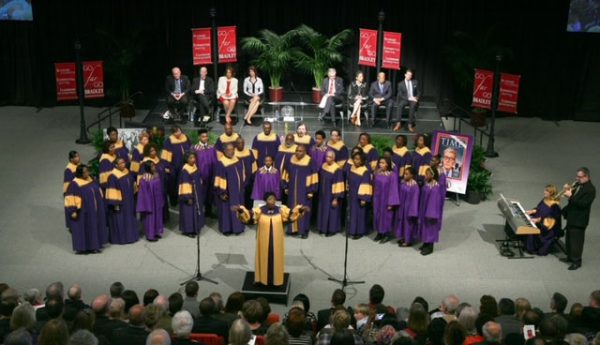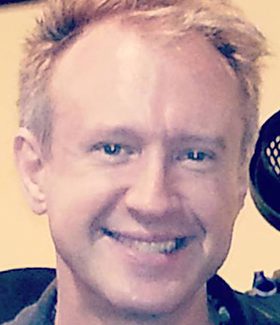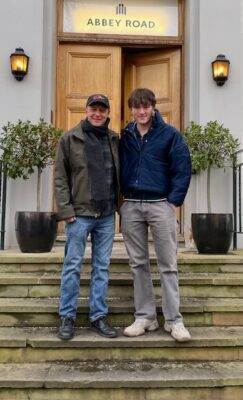Three-Day Musical Residency at Western Illinois University to Celebrate African American Composer
A relationship, developed through a love of music and culture, has led to a unique ensemble gathering at Western Illinois University for a three-day residency in May to record a significant, sacred work by an African American composer.
WIU Director of Jazz Studies John Cooper, and his wife, Gayle, have a long friendship with Sharon Reed, the founder and artistic director of the Heritage Ensemble community choir in Peoria, IL. Through her research into music composed by African American artists, Reed discovered works by Glenn Burleigh, an Oklahoma composer who not only published his own pieces, but was highly protective of who performed them.
After Burleigh passed away in 2007, his family kept his work in their homes. While Reed was researching musical works by African American composers, she learned of Burleigh’s work and the Heritage Ensemble performed one of his pieces on a smaller scale in 2008. A musical colleague of Burleigh’s later gave Reed all of his remaining scores for the Alpha Mass, a sacred composition that brings together Western Art musical traditions as well as Jazz, Gospel, Blues, and Latin genres.

In May, the Heritage Ensemble, and musicians from across the United States, will gather in WIU’s College of Fine Arts and Communication Recital Hall to perform Burleigh’s “Alpha Mass,” a 15-movement Catholic mass. The DVD recording will be captured by some of WIU’s video and lighting engineers, and will be placed on YouTube as well.
“This project seeks to document a wonderful work by a great African American composer,” said John. “Sharon and I were brainstorming appropriate subjects for a recording of this scope…a project that would help to document the Heritage Ensemble and make a contribution to the body of this often-underrepresented literature. This mass is Latin, blues and gospel, all in one piece.”
Reed said a large part of the production process has been finding research grants and preparing the music for recording.
When speaking about the mission of the Heritage Ensemble Reed commented, “I call this the process of ‘edutainment.’ We are educating ourselves on the music first as an ensemble. We are also educating and entertaining our audiences about the cultural heritage of African American experience through music.”
Because the existing scores were not fully orchestrated, John had to write several of the arrangements that did not yet exist (or have been lost) for the 15-movement piece. He has also hired all of the musicians to accompany the choir in their Macomb recording session.
“This truly is an archaeological project,” said John. “We received the piano and voice sections from Burleigh’s colleague, and I scored the orchestrations for the musicians that were not available. We are contracting the best musicians from Illinois and from across the country.”
Reed and Gayle have a 30-year relationship, working together in Peoria-area churches and schools. Gayle, who serves as staff accompanist, will play piano with the studio orchestra, and John will play trumpet as part of a 12-member group.
The Heritage Ensemble performed their inaugural concert in August 1999, and frequently collaborates with other musical entities throughout the region, and across the country, including a performance at Carnegie Hall in New York City. While precautions from the COVID-19 pandemic have reduced the group’s size from 30-35 to just over 20, Reed said technology has enabled the group to present concerts and expand its audience.
“The Heritage Ensemble was formed out of the need to fill a cultural void,” said Reed. “The recording project is a major undertaking for the Heritage Ensemble, and an opportunity to document the accomplishments of the group and this wonderful composition of Burleigh’s. John is a major part of that. He is a member of our ensemble, and serves the ensemble through compositions, arrangements, performance and contracting. This is a community choir, but it’s more of a family. This project feels like it was meant to be.”

The hope is that Burleigh’s sister, LaVonne can travel to Macomb from Chicago to see the recording of her brother’s music.
“This project serves to celebrate a masterwork of African American art,” said John. “Burleigh was so protective of his music and was self-published. If not for a project like this, these pieces are in jeopardy of falling too far from American consciousness. Many things came together, thanks to the determination of Sharon. There were a million opportunities to stop the project, but she has exhibited a sense of fierce urgency to keep it moving forward.”
John, who is retiring at the end of the spring semester, said he is proud of how the University has also embraced the project, helping with the video and audio production.
For more information about the Heritage Ensemble, visit heritageensemble.com.













Leave a Reply
You must be logged in to post a comment.